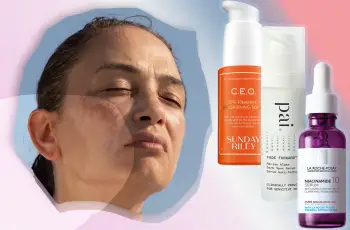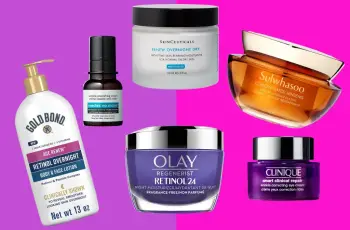
Can You Use Retinol with Rosacea?
Finding the right skincare routine can be tough for anyone. But if you have rosacea, it often feels even more complicated. Flare-ups, redness, and sensitive skin can make choosing products tricky. It’s no surprise if you feel overwhelmed.
One ingredient many find confusing is retinol. Known as a powerful anti-aging treatment, retinol can sometimes cause dryness or irritation. So, can you really use retinol if you have rosacea?
At first, it may seem counterintuitive to apply a strong ingredient to already sensitive, inflamed skin.
In this post, we’ll clear up the confusion. By the end, you’ll understand whether retinol can be safely included in a rosacea-friendly skincare routine—and how to do it right.
Will Retinol Make Rosacea Worse?
The short answer: no, retinol doesn’t necessarily worsen rosacea. Many people assume retinol exfoliates aggressively, making rosacea flare-ups worse.
But retinol actually speeds up your skin’s cell turnover process.
This means it helps shed dead, damaged skin cells faster, revealing fresher, healthier skin underneath. Over time, this can reduce inflammation and improve the look of rosacea-affected areas.
However, rosacea-prone skin is delicate. If your skin is very sensitive or inflamed, it’s smart to check with a dermatologist before starting retinol.
They can recommend the right concentration and formulation for your skin type.
Can You Use Retinol Cream on Rosacea?
Yes, you can use retinol cream with rosacea—if you introduce it carefully. Start slow and always consult a medical professional before beginning.
When used properly, retinol can reduce inflammation linked to rosacea. To avoid dryness or irritation, pair retinol with hydrating products.
For example, apply a serum rich in hyaluronic acid before your retinol cream. This helps maintain moisture and soothe your skin.
Start retinol once a week at night. Let your skin adjust, then gradually increase usage to every other evening as tolerated.
What Retinol Is Best for Rosacea?
Not all retinol products are created equal. If you have rosacea, opt for gentler, over-the-counter retinol formulas with lower concentrations.
Look for lightweight serums or oils with added soothing and hydrating ingredients. Products containing ceramides, niacinamide, or hyaluronic acid help strengthen your skin barrier.
This supports skin repair and reduces irritation.
A strong skin barrier protects against damage from UV rays, pollution, and dryness—all common rosacea triggers. Avoid prescription-strength retinoids unless recommended by your doctor.
What Should You Avoid If You Have Rosacea?
Certain skincare ingredients are known to irritate rosacea-prone skin. To keep flare-ups at bay, avoid these:
Glycolic acid: This exfoliating acid can be too harsh.
Lactic acid: Another acid that may cause sensitivity.
Alcohol: Often drying and irritating.
Fragrance: Can trigger inflammation and redness.
These ingredients are common in toners, astringents, and some cleansers. Instead, choose gentle, fragrance-free cleansers that don’t foam aggressively.
How Do You Calm a Rosacea Flare-Up?
If you’re experiencing a flare-up, follow these soothing tips:
Use a mild cleanser with lukewarm water. Avoid hot water and harsh scrubbing. Pat your skin dry with a soft towel.
Moisturize twice daily. Choose rich, hydrating formulas with ingredients like hyaluronic acid.
Skip exfoliating scrubs or harsh toners. Even gentle physical exfoliants can worsen rosacea.
Always wear a broad-spectrum SPF daily, even on cloudy days. UV exposure can trigger rosacea and accelerate aging.
Test any new makeup on a small skin patch before full application. Fragrances or irritants in cosmetics can worsen rosacea.
How Long Do the “Retinol Uglies” Last?
The “retinol uglies” describe the initial side effects when starting retinol. You may notice redness, dryness, peeling, or itchiness. These effects can be frustrating but are usually temporary.
Most people experience these symptoms for about one to three weeks. During this period, your skin is building tolerance and adjusting to retinol’s effects.
To ease discomfort, use hydrating serums with hyaluronic acid and gentle moisturizers. Avoid over-washing or using additional irritating products.
If irritation persists beyond a month or worsens, stop retinol and seek advice from a dermatologist.
Introducing Retinol When You Have Rosacea: Step-by-Step
Consult Your Dermatologist: Always start with professional advice, especially if your rosacea is severe.
Choose the Right Product: Start with a low-percentage retinol serum or cream that’s gentle and hydrating.
Patch Test: Apply a small amount on a less sensitive area and wait 24-48 hours to check for adverse reactions.
Start Slowly: Begin with one application per week at night.
Hydrate and Protect: Use hydrating serums like hyaluronic acid before retinol and moisturize well afterward.
Increase Gradually: If tolerated, increase frequency to every other night after a few weeks.
Daily Sunscreen: Use a broad-spectrum SPF every day to protect sensitive skin.
Why Retinol Can Help Rosacea in the Long Run
While it might seem contradictory, retinol’s ability to speed up cell renewal can reduce redness and inflammation caused by rosacea. It also helps smooth uneven skin texture and strengthens skin resilience.
Over time, retinol encourages healthier skin, making flare-ups less frequent and less severe. Combined with a good hydration routine and sun protection, retinol can become a valuable tool for managing rosacea.
Final Thoughts
Rosacea can make skincare feel like a minefield, but retinol doesn’t have to be off-limits.
When introduced carefully and combined with hydrating, barrier-supporting products, retinol can improve the appearance and health of rosacea-prone skin.
Remember to consult a dermatologist before starting retinol, especially if your rosacea is active or severe.
With patience and the right approach, retinol can become a gentle yet effective part of your skincare routine.
For more tips on caring for sensitive and rosacea-prone skin, follow us on Instagram and stay updated with the latest skincare advice, product launches, and exclusive deals!
If you want, I can help create a concise FAQ or product recommendations tailored for rosacea-prone skin next. Would you like that?


